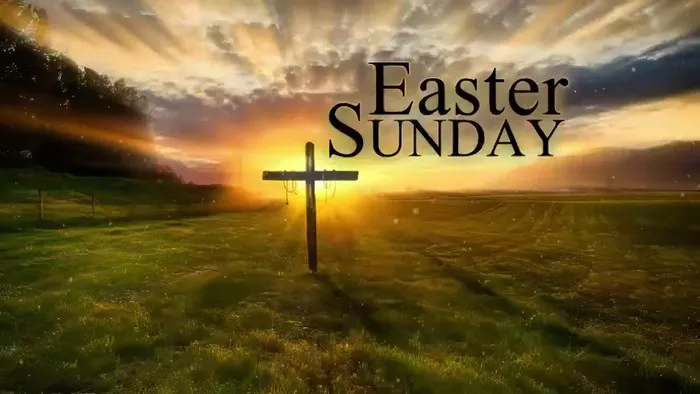Easter Sunday stands as the pinnacle of the Christian calendar, marking the resurrection of Jesus Christ and symbolizing hope, redemption, and new life. For Christians around the world, this day holds profound significance, celebrated with joy, reflection, and spiritual renewal. At the heart of Easter Sunday lies scripture, serving as a guiding light for believers seeking to understand the profound message of Christ’s resurrection. In this article, we delve into the essence of Easter Sunday and explore the scriptures that encapsulate its timeless significance.
The Resurrection Narrative: Matthew 28:1-10
In the Gospel of Matthew, the resurrection narrative unfolds with poignant detail, painting a vivid picture of the empty tomb and the angelic proclamation of Christ’s triumph over death. Matthew 28:1-10 captures the essence of Easter Sunday, inviting readers into the transformative power of resurrection hope. The passage begins with the discovery of the empty tomb by Mary Magdalene and the other Mary, symbolizing the dawn of a new era in human history.
As the women approach the tomb, they encounter an angel who delivers the astonishing news: “He is not here; he has risen, just as he said” (Matthew 28:6, NIV). These words resonate with profound truth, affirming the fulfillment of Jesus’ promise to conquer death and offering reassurance to all who believe in him. The angel’s message echoes throughout the ages, reminding us that Easter Sunday is not merely a historical event but a living reality that continues to shape our faith and our lives.
The Empty Tomb: Mark 16:1-8
In the Gospel of Mark, the narrative of Easter Sunday unfolds with a sense of urgency and awe. Mark 16:1-8 portrays the women’s journey to the tomb and their encounter with the angelic messenger, who delivers the stunning news of Christ’s resurrection. As the women enter the tomb, they are greeted by a young man dressed in white, who declares, “Do not be alarmed. You seek Jesus of Nazareth, who was crucified. He has risen; he is not here” (Mark 16:6, ESV).
This passage captures the mystery and wonder of Easter Sunday, inviting readers to contemplate the profound implications of Christ’s victory over death. The empty tomb serves as a powerful symbol of hope and transformation, reminding us that the resurrection is not merely an event of the past but a reality that continues to shape our present and our future. As we reflect on Mark’s account of Easter Sunday, we are invited to embrace the promise of new life and to live in the light of Christ’s victory over sin and death.
The Road to Emmaus: Luke 24:13-35
In the Gospel of Luke, Easter Sunday is portrayed as a journey of discovery and revelation. Luke 24:13-35 recounts the encounter between Jesus and two disciples on the road to Emmaus, a narrative rich in symbolism and spiritual depth. As the disciples walk and talk with Jesus, they are initially unaware of his true identity, lamenting the events of his crucifixion and burial.
However, as Jesus explains the scriptures to them and breaks bread at the table, their eyes are opened, and they recognize him as the risen Lord. This encounter encapsulates the essence of Easter Sunday, reminding us that Christ is present with us even in our moments of doubt and despair. The road to Emmaus becomes a metaphor for our own spiritual journey, as we walk alongside Jesus and gradually come to understand the fullness of his resurrection power.
The Great Commission: John 20:19-23
In the Gospel of John, Easter Sunday culminates in a commissioning of the disciples to proclaim the good news of Christ’s resurrection to the world. John 20:19-23 depicts Jesus appearing to his disciples in the upper room, breathing the Holy Spirit upon them, and sending them forth as witnesses to his victory over death. This passage emphasizes the transformative power of Easter Sunday, as the disciples are empowered by the Holy Spirit to continue the work that Jesus began.
As we reflect on the Great Commission, we are reminded that Easter Sunday is not only a celebration of Christ’s resurrection but also a call to action for all believers. We are called to bear witness to the reality of the resurrection in our words and deeds, sharing the hope and joy of Easter with all whom we encounter. In fulfilling the Great Commission, we participate in the ongoing story of redemption, inviting others to experience the transformative power of Christ’s resurrection for themselves.
Conclusion
Easter Sunday invites believers to journey deeper into the heart of the resurrection mystery, exploring the scriptures that illuminate its profound significance. From the empty tomb to the road to Emmaus, from the angelic proclamation to the Great Commission, these passages offer glimpses into the transformative power of Easter Sunday, inviting us to encounter the risen Christ in our own lives.
As we reflect on these scriptures, may webe inspired to embrace the hope and joy of Easter, living as resurrection people in a world hungering for new life. May we proclaim with boldness and conviction the reality of Christ’s victory over sin and death, inviting others to join us on this journey of faith and transformation. And may the promise of Easter Sunday continue to guide and sustain us, leading us ever closer to the risen Lord who offers us hope, redemption, and new life.

